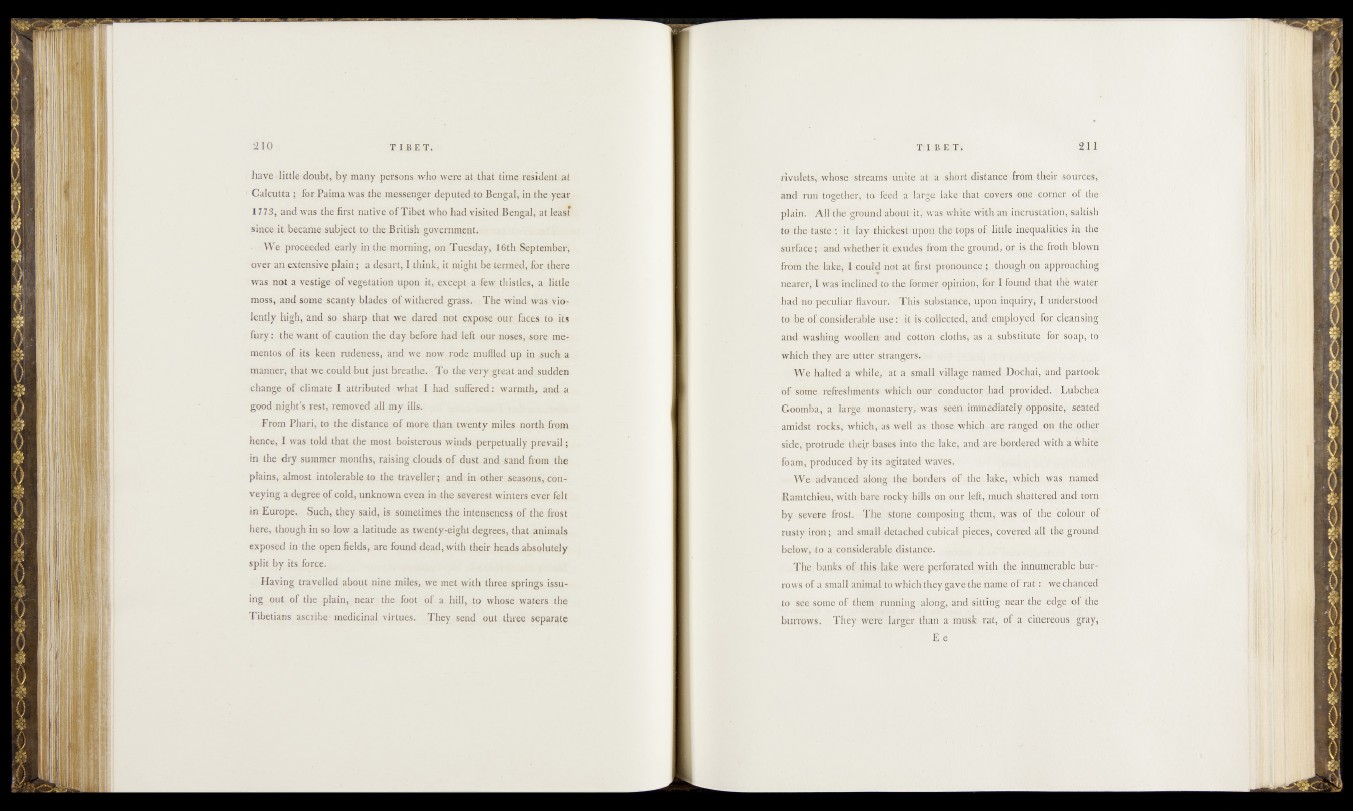
have-.little doubt, bymany persons who, were -at; that time resident;^
Calcutta ; lor Paima was the messenger deputed,to Bengal, in the year
1773, and was the first native of Tibet who had visited Bengal, at least
sinceut-hecame subject to. the:British government.
We proceeded early in the; morning, oh. Tuesday,- 16th September,
oyer an extensive plain; a desart,! think, it might be termed, for there
was not a vestige of vegetation upon it, except a few thistles, a -little
moss, and some.scanty blades of withered grass. The wind was violently
high, and so sharp that we dared not expose ourfapesitoits
fury: the want of caution the day before had left ouijn§ses,vSlre mementos
of its keen rudeness, and we now. rode, muffled; up ha ssp^hsa
manner, that we could but just breathe. To the very great and sudden
change of climate I attributed what I had suilcred: warmth, and, a
good night’s rest, removed all my ills.
From Phari, to the distance of more than twenty miles north from
hence, I was told that the most boisterous winds perpetually prevail ;
in the dry summer months, raising clouds of dust and sand from the
plains, almost intolerable to the traveller; and m other seasons, conveying
a degree of cold, unknown even in the severest winters ever felt
in Europe. Such, they said, is sometimes the intenseness of the frost
here, though in so low a latitude as twenty-eight degrees, that animals
exposed in the open fields, are found dead, with their heads absolutely
split by its force.
Having travelled about nine miles, we met with three springs issuing
out. of the plain, near the foot of a hill,-to whose.waters the
Tibetians ascribe medicinal virtues. They send out three separate
rivulets," whose streams -uniifc nirfh-vsjimfc distance from, theirs,miraes^
and inn together, to'feed hte lh.itjGqwers-,<^evsomcr.,wh ilia®
plain. AI ft the'igrofinduboiilMt.'.w as -v^lutei \vi>b*.mrnn.iustation.'«g]jish
to the taste : it ‘layithickestmp^itJldsti'ipW ol liujq ii^cjfiahtits ly-lfe'
siWacwpsand whethenhijdxudesfrvifpfhe.ggQtinfl, ggjs the. froth bhpjn'
hom the lake? 1 could not.aL’hr-,(SfpJr,onourjLOJ:I lliojiol^on^ippipttcliing
nearer, I was inclined to the former opinion, lm,J^joiiml ^ha^j^b^toi,
had nopCculiai lUvoui. 1 his substance, upon^n>q(iiu'rvVf,ipAJerstopd
to;he of considerable sise: it-'js^oll.ected,, and;;4en g ^h f^.clejiiM h g j
and washing woollen- and GOt^an»5^Qths, as ip - to
%Weh they are utter-strangers." «,
We halted a while, at a small village named, Doclui and p^rt^e
of some refreshments’ which^onr^g^n^%^^ad>^p^iided;.^,Lu^che,a
GoomBa,ya larger monastery,-was i^e%,immediately oppysi^e.^sj^u d
amidst'JitoeksVvvhichv as well as those: which arq rangpd , on; th ith e r
side,protrude1 thejr’bases’into, thfelake; ^nd.arbjt^^dered witJi^ajWhitte’
foam, produced by its-'agitated waves.
We- advanced akmg the borders of^t^dajee^hi^h was- named*-
Hamtchieu,-with bare rocky hills on onr.lpJijjnUjCh. shattered andt^orm
by severe frost, - The ostone1 comp^ing, them, was of1, the colour of
rusty irpii; andsip^l.j^t^ched cubical pi^es^cqverediall the ground
below; to a considerable distance. „
The; banks of this lake were pciforatcd with the mnumeiable burrows
of a small animal toswhich they gav&thfe name ol ra t: ' c. h u \
to see some of them running along, and sitting' ri&at; the edge‘of the-’
burrows. They were larger than. a musk rat, of,. &temereO,risf gray,
' E e